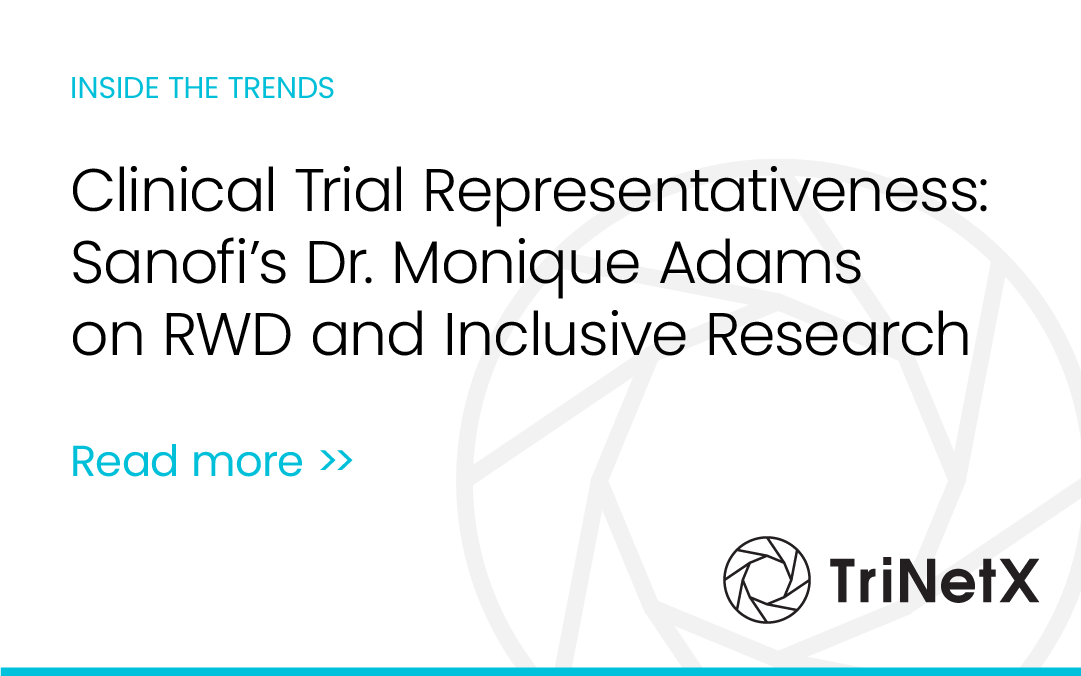In our conversation, we focused specifically on the topic of “Equity by Design: Building Inclusive Research Frameworks,” one of the five key healthcare trends experts from TriNetX explore in our recent eBook. Equity by Design examines how representativeness remains a key driver in clinical research, even in a shifting regulatory landscape. What stood out most was just how closely aligned our experiences have been when it comes to the structural and operational barriers facing sponsors today.
Why Progress Has Been So Slow
When Monique and I discussed the current state of play, she reiterated something that I’ve heard consistently across our community: despite decades of public and academic discussion, progress has been incremental. We still see entire patient groups underrepresented in trial cohorts, including many racial and ethnic minorities, women, and older populations. And it isn’t for lack of intent. In fact, most organizations now consider diversity and inclusion a top priority but translating that into measurable action is still incredibly difficult. As Monique put it, we need to move past simply acknowledging disparities and start addressing them with the same rigor we apply to protocol design and site feasibility.
Real-World Data as a Bridge to Equity
One of the most compelling insights from our discussion was around the role of real-world data (RWD) in debiasing both study design and site strategy. Monique emphasized that sponsors often rely on historical enrollment benchmarks when planning new trials, but those datasets can be inherently biased because they reflect the very disparities we are trying to correct.
Instead, organizations should use real-world evidence (RWE) to highlight where the true patient populations exist and where unmet needs are most acute. By layering in social determinants of health (SDOH) and environmental factors, sponsors can surface new geographies, new sites, and even new community partners that reflect the broader population. In short, RWD can be a powerful bridge between scientific rigor and equity in action.
Building and Sustaining Patient Trust
We also discussed how patient trust (and mistrust) plays a fundamental role in whether inclusion efforts succeed. Monique noted that meaningful community engagement cannot be treated as a one-off initiative or checked box; it must be sustained, authentic, and rooted in transparency. Using trusted messengers, partnering with local organizations, and ensuring consistent communication across all phases of a trial are all essential to promoting health literacy and building long-term participation.
Signs of Optimism on the Horizon
Toward the end of our conversation, I asked Monique about what gives her the most optimism for the future. Her answer was both simple and inspiring. She believes that the growing focus on actionable data, combined with heightened regulatory attention, makes this the most promising moment we’ve seen in years for driving real change. Regulators across the U.S. and Europe are setting clear expectations for inclusion plans, and sponsors are responding with more thoughtful strategies and partnerships. That alignment across policy, science, and operations is unprecedented, and it’s why Monique believes we are finally at a tipping point.
Access the Full Conversation
This blog only scratches the surface of our discussion. We covered so much more in the full vodcast episode, including:
- Practical steps sponsors can take right now to operationalize data-driven diversity strategies,
- The importance of internal cultural change, and
- How cross-sector collaboration can accelerate progress.
The views expressed by Monique are her own and do not represent the official position of Sanofi or any of its affiliates.
About Akiko Shimamura
Akiko is an experienced leader in the life sciences industry, having held a range of senior roles. As Senior Vice President at TriNetX, she is responsible for developing products and managing teams focused on trial design and optimization. As the former Vice President of Medidata, she has overseen products across real-world evidence (RWE), commercial analytics, and tokenization. Akiko has a wealth of experience in consulting, having previously worked at McKinsey & Company where she provided advice to companies on life sciences and analytics.
About Monique Adams, PhD
Monique Adams is the Executive Director, Global Head, Diversity & Inclusion in Clinical Trials at Sanofi. Monique is working with internal and external partners to drive Sanofi’s vision, strategy and implementation of a holistic framework for inclusion and diversity in clinical trials. Before joining Sanofi, Monique served as the Director for Janssen Clinical Innovation in Global Development. She is a thought expert on identifying innovative ways to ensure clinical trials are equitable and accessible. Monique’s main areas of expertise include clinical trial operations, process improvement, functional and operational leadership, therapeutic area expertise across multiple therapeutic areas and strategic clinical innovation management. Monique is passionate about Diversity and Inclusion. At Janssen, Monique led the Diversity, Equity & Inclusion (DEI) Advisory Board. In this role, she set the strategic direction for the three DEI pillars of advancing culture, building a diverse workforce and enhancing business performance and reputation. As the Janssen Clinical Innovation lead, she set the strategic direction and drove projects that increased the representation and accessibility of clinical trials. Monique received her BS in biology from Tougaloo College, a MS in physiology from Southern Illinois University, and her Ph.D. in pharmacology from the University of Washington.

